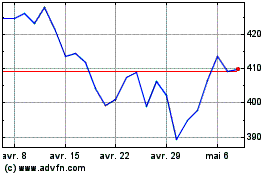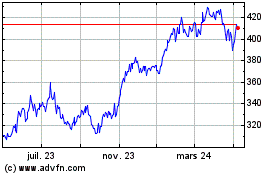Oracle Wins Bidding for TikTok in U.S., After Microsoft Proposal Rejected -- 2nd Update
14 Septembre 2020 - 3:01AM
Dow Jones News
By Georgia Wells and Aaron Tilley
Oracle Corp. won the bidding for the U.S. operations of the
video-sharing app TikTok, a person familiar with the matter said,
beating out Microsoft Corp. in a deal to salvage a social-media
service that has been caught in the middle of a geopolitical
standoff.
Oracle is set to be announced as TikTok's "trusted tech partner"
in the U.S., and the deal is likely not to be structured as an
outright sale, the person said.
The next step is for the White House and the Committee on
Foreign Investment in the U.S. to approve the deal, the person
said, adding that the participants believe it satisfies the
concerns around data security that have been previously raised by
the U.S. government.
The White House declined to comment on the deal on Sunday.
Microsoft earlier Sunday said it was notified earlier in the day
of the decision by TikTok parent ByteDance Ltd.
"We are confident our proposal would have been good for TikTok's
users, while protecting national security interests," the company
said in a statement. "To do this, we would have made significant
changes to ensure the service met the highest standards for
security, privacy, online safety, and combatting disinformation,
and we made these principles clear in our August statement. We look
forward to seeing how the service evolves in these important
areas."
The move by Beijing-based ByteDance comes days after the Chinese
government threw negotiations into doubt when it issued new export
restrictions late last month on the kind of artificial intelligence
technology TikTok uses. The algorithms, which determine the videos
served to users and are seen as TikTok's secret sauce, were
considered part of the deal negotiations up until the Chinese
policy change raising questions among the parties involved in
negotiations over how to value the social-media business.
President Trump has said repeatedly that he would shut down
TikTok in the U.S. if it isn't sold to an American company by Sept.
15, though it isn't clear if that is the operative deadline. In an
Aug. 6 executive order, the White House gave ByteDance a 45-day
deadline before it would ban the app, which the Trump
administration says poses an economic and national-security threat
to U.S. interests, if it isn't sold to a U.S. buyer. That gives the
parties until Sept. 20 to seal a deal.
TikTok has soared to around 100 million monthly users in the
U.S., from about 11 million in early 2018, and they are considered
among the most lucrative in the app's global user base of about 689
million, though the app still loses money.
The Trump administration has pushed for a sale, expressing
concern that TikTok could pass on data it collects from Americans
streaming videos to China's authoritarian government. TikTok has
said it hasn't been asked to share data with the Chinese government
and wouldn't do so if asked.
The structure of Oracle's deal wasn't immediately known.
The White House's role in bringing the sale about has little, if
any, precedent in the annals of American deal making. Despite
TikTok's reputation for frivolity, White House officials over the
past year have directed increasing scrutiny at what they say are
national security risks that the data the app collects could be
routed to Chinese authorities.
Deal talks involved some of the biggest names in corporate
America. Microsoft was long considered the front-runner after it
said in early August that it was in talks with ByteDance over a
purchase of TikTok's operations in the U.S. along with those in
Australia, Canada and New Zealand. Walmart Inc. later said it had
joined with Microsoft.
Oracle's bid was spurred on by General Atlantic and Sequoia
Capital, two major investors in TikTok's Chinese parent company,
that sought to be part of a deal. It couldn't be determined late
Sunday whether those firms are participating in the final Oracle
bid.
Chinese-U.S. tensions have derailed other high-profile tech
deals. The Trump administration blocked Broadcom Ltd.'s $117
billion hostile bid for Qualcomm Inc. over concerns the deal would
weaken the U.S. chip maker and cede market power to China. Months
later Chinese antitrust regulators failed to approve Qualcomm's bid
to buy Dutch chip maker NXP Semiconductors NV.
But those deals generally didn't gain the widespread attention
the TikTok talks garnered with its millions of loyal users worried
about the future of the app.
Write to Georgia Wells at Georgia.Wells@wsj.com and Aaron Tilley
at aaron.tilley@wsj.com
(END) Dow Jones Newswires
September 13, 2020 20:46 ET (00:46 GMT)
Copyright (c) 2020 Dow Jones & Company, Inc.
Microsoft (NASDAQ:MSFT)
Graphique Historique de l'Action
De Mar 2024 à Avr 2024

Microsoft (NASDAQ:MSFT)
Graphique Historique de l'Action
De Avr 2023 à Avr 2024
